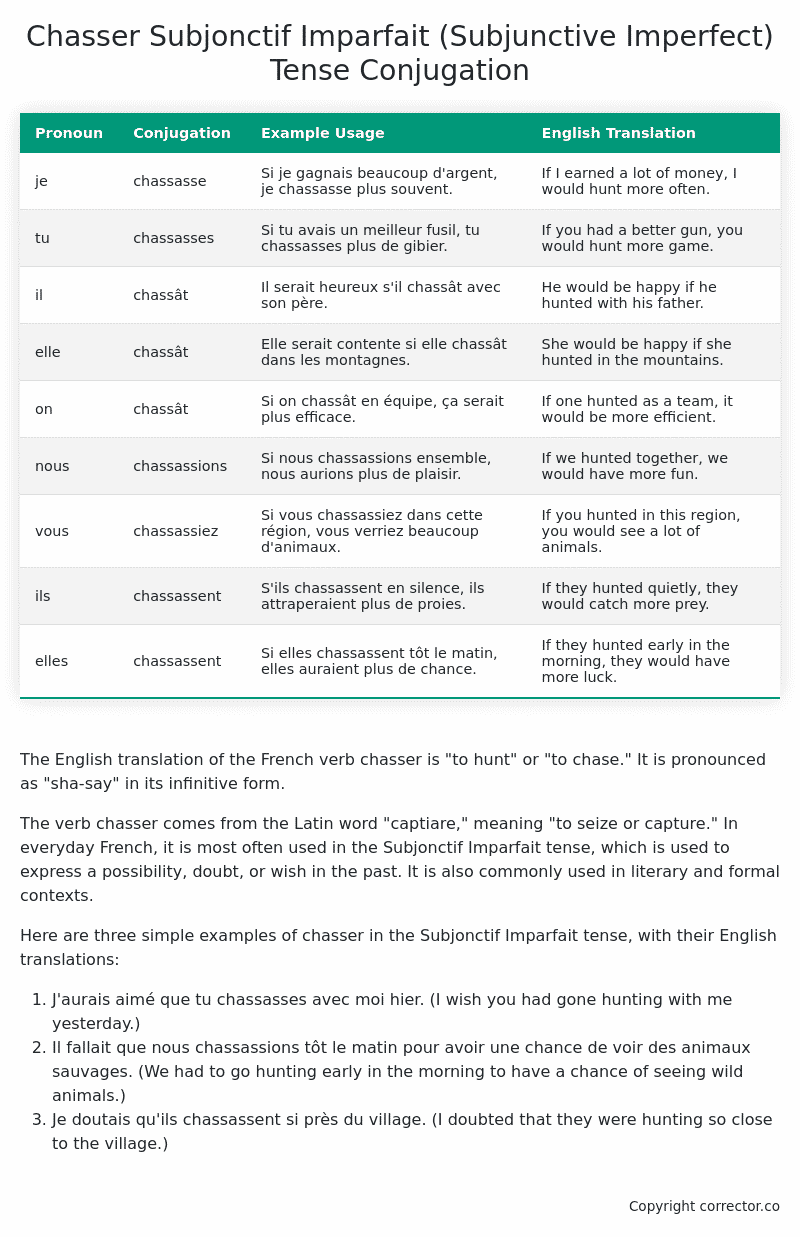Subjonctif Imparfait (Subjunctive Imperfect) Tense Conjugation of the French Verb chasser
Introduction to the verb chasser
The English translation of the French verb chasser is “to hunt” or “to chase.” It is pronounced as “sha-say” in its infinitive form.
The verb chasser comes from the Latin word “captiare,” meaning “to seize or capture.” In everyday French, it is most often used in the Subjonctif Imparfait tense, which is used to express a possibility, doubt, or wish in the past. It is also commonly used in literary and formal contexts.
Here are three simple examples of chasser in the Subjonctif Imparfait tense, with their English translations:
- J’aurais aimé que tu chassasses avec moi hier. (I wish you had gone hunting with me yesterday.)
- Il fallait que nous chassassions tôt le matin pour avoir une chance de voir des animaux sauvages. (We had to go hunting early in the morning to have a chance of seeing wild animals.)
- Je doutais qu’ils chassassent si près du village. (I doubted that they were hunting so close to the village.)
Table of the Subjonctif Imparfait (Subjunctive Imperfect) Tense Conjugation of chasser
| Pronoun | Conjugation | Example Usage | English Translation |
|---|---|---|---|
| je | chassasse | Si je gagnais beaucoup d’argent, je chassasse plus souvent. | If I earned a lot of money, I would hunt more often. |
| tu | chassasses | Si tu avais un meilleur fusil, tu chassasses plus de gibier. | If you had a better gun, you would hunt more game. |
| il | chassât | Il serait heureux s’il chassât avec son père. | He would be happy if he hunted with his father. |
| elle | chassât | Elle serait contente si elle chassât dans les montagnes. | She would be happy if she hunted in the mountains. |
| on | chassât | Si on chassât en équipe, ça serait plus efficace. | If one hunted as a team, it would be more efficient. |
| nous | chassassions | Si nous chassassions ensemble, nous aurions plus de plaisir. | If we hunted together, we would have more fun. |
| vous | chassassiez | Si vous chassassiez dans cette région, vous verriez beaucoup d’animaux. | If you hunted in this region, you would see a lot of animals. |
| ils | chassassent | S’ils chassassent en silence, ils attraperaient plus de proies. | If they hunted quietly, they would catch more prey. |
| elles | chassassent | Si elles chassassent tôt le matin, elles auraient plus de chance. | If they hunted early in the morning, they would have more luck. |
Other Conjugations for Chasser.
Le Present (Present Tense) Conjugation of the French Verb chasser
Imparfait (Imperfect) Tense Conjugation of the French Verb chasser
Passé Simple (Simple Past) Tense Conjugation of the French Verb chasser
Passé Composé (Present Perfect) Tense Conjugation of the French Verb chasser
Futur Simple (Simple Future) Tense Conjugation of the French Verb chasser
Futur Proche (Near Future) Tense Conjugation of the French Verb chasser
Plus-que-parfait (Pluperfect) Tense Conjugation of the French Verb chasser
Passé Antérieur (Past Anterior) Tense Conjugation of the French Verb chasser
Futur Antérieur (Future Anterior) Tense Conjugation of the French Verb chasser
Subjonctif Présent (Subjunctive Present) Tense Conjugation of the French Verb chasser
Subjonctif Passé (Subjunctive Past) Tense Conjugation of the French Verb chasser
Subjonctif Imparfait (Subjunctive Imperfect) Tense Conjugation of the French Verb chasser (this article)
Subjonctif Plus-que-parfait (Subjunctive Pluperfect) Tense Conjugation of the French Verb chasser
Conditionnel Présent (Conditional Present) Tense Conjugation of the French Verb chasser
Conditionnel Passé (Conditional Past) Tense Conjugation of the French Verb chasser
L’impératif Présent (Imperative Present) Tense Conjugation of the French Verb chasser
L’infinitif Présent (Infinitive Present) Tense Conjugation of the French Verb chasser
Struggling with French verbs or the language in general? Why not use our free French Grammar Checker – no registration required!
Get a FREE Download Study Sheet of this Conjugation 🔥
Simply right click the image below, click “save image” and get your free reference for the chasser Subjonctif Imparfait tense conjugation!

Chasser – About the French Subjonctif Imparfait (Subjunctive Imperfect) Tense
Formation
Common Everyday Usage Patterns
Interactions with Other Tenses
Subjonctif Présent
Indicatif Passé Composé
Conditional
Conditional Perfect
Summary
I hope you enjoyed this article on the verb chasser. Still in a learning mood? Check out another TOTALLY random French verb conjugation!


